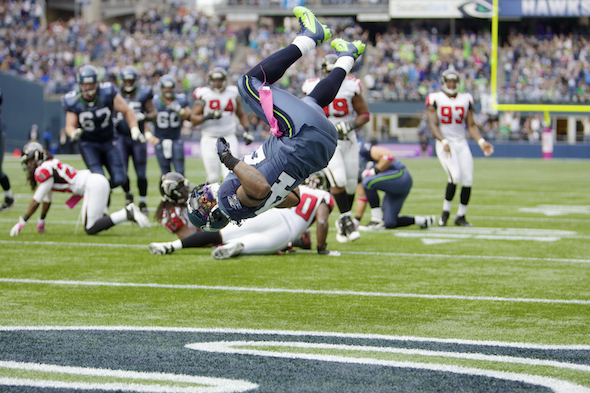
Down 27-7 early in the third quarter, with five first downs and five yards rushing against an Atlanta team that was 13-3 a year ago, the Seahawks Sunday were about an oil-tanker car short of a complete, flaming train wreck. The National Guard had to have been on alert.
By the final seconds, so many preposterously good things had happened that it really didn’t occur to many Seahawks that placekicker Steven Hauschka would NOT make a 61-yard field goal to win the game.
That’s how intoxicating was the second-half renaissance. By then, the Seahawks were ready to believe they would ride off the Clink Field carpet triumphantly upon unicorns, then climb aboard Pegasus for an airborne loop around the stadium roof.
“We thought he was going to hit it,” said tight end Zach Miller. “No doubt about it. We felt we were going to walk off the field winners.”
For those new to the physics of NFL field goals, only once, a 63-yarder by club-footed Tom Dempsey, has ever traveled farther in a game. And that was 41 years ago. Alas for the Seahawks and their fans, it was not to be. To borrow from golf, Hauschka over-swung, hit it poorly and was not close.
But that the Seahawks as a team were close, losing 30-28 with a even a sliver of a chance to win, was, in the ever-optimistic mind of coach Pete Carroll, a pivot point in 2011.
“I told these guys in the locker room that we found something today that was powerful,” he said post-game. He could have referred to the sack-free day by the maligned offensive line. Or the 319-yard passing day of maligned quarterback Tarvaris Jackson. Or the recovery of the defense, which hadn’t been maligned until a grim first half, rallying to hold the Falcons in the second half to two field goals and 29 yards rushing.
He was referring to the whole previously maligned package, which in the second half Sunday was as good as the adolescent Seahawks have looked in the first quarter of the season. They’re still 1-3, of course, and they still have to play the Giants Sunday on the icky old East Coast. But no organism above an amoeba expected anything else at this point in the season. To have even a sense of air and light at this point is, probably, powerful.
“The execution we demonstrated when it was as tough as it could get, was excellent,” Carroll said. Most remarkable was that fans finally saw how Jackson could play when he didn’t have a defender hanging on to his face a moment after the snap. Particularly when the Seahawks were in the no-huddle tactic.
“I guess it takes the thinking out of it,” said Jackson, in a remarkable but savvy bit of candor. “Being a younger player, I tend to think a little bit too much. I’ve got so much stuff going through my head. (The no-huddle) eliminates a lot of thinking for the guys.”
Anyone familiar with the psychology of competitive sports knows that the worst thing an athlete can do is think. Obvious jokes aside, games at the elite level are decided in tenths of a second, meaning that any meaningful time spent pondering options and fearing mistakes tends to produce boxcars all over the railroad right-of-way.
The preponderance of youth on offense means a whole lot of thinking has been going on this season. In the second half, finally, there was some doing.
After intermission, Jackson completed 17 of 24 passes for 186 yards. His two interceptions came off re-directed passes that hit receivers. He was knocked down a few times, but was never sacked.
“I feel fresh, like I just came to the stadium,” Jackson said, offering one of his first attempts at humor this season. “I want to take my hat off to (the O-line) today. It shows that the extra time they’re putting in is paying off.”
In the end, perhaps the major miscues belonged to the coaching staff, which burned two critical timeouts in the second half because too many defensive players were on the field. Even one of those timeouts probably would have made the difference in the final 1:49, when the Seahawks took possession at their own 15-yard line needing to get about 50 yards to give Hauschka a reasonable shot at the game-winning kick.
They reached the Atlanta 45-yard line with 22 seconds left, but wide receiver Sidney Rice started the next play too soon, costing five yards.
“That was critical,” said Carroll. Said Rice: “No excuse for it.”
The Seahawks completed one more pass to the Atlanta 43, but at fourth-down-and-eight with 13 seconds left, Carroll made the decision to kick, reasoning that a failure to get the first down would end the game.
“I wanted to give us a chance to win it,” he said. “We’re going to take a shot at making a historic kick, and win a great football game.”
The percentage for success was low. But compared to the halftime number of zero, why not give it a thump? The Seahawks lost the game in the first half, but still had a half to establish that they were going to stop thinking and start playing.
They ran out of clock. They did not run out of imagination or will. They don’t award points for that in the NFL. Then again, there is no other way to get points.
